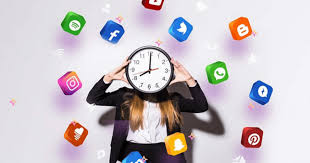From TikTok trends to Instagram grids, social media plays a large role in daily life. It connects people, offers opportunities, and shapes communication. Despite its benefits, overuse of social media is linked to rising anxiety, particularly among younger generations. Better understanding this connection is necessary to address the growing issue.
How Social Media Contributes to Anxiety
Social media platforms are crafted to keep users engaged, often using features like likes and shares. These features can lead to feelings of inadequacy and stress. Studies show that social media contributes to anxiety in several ways.
Comparisons and Unrealistic Expectations
Social media often displays the idealized versions of people’s lives, showing vacations, beauty, and success. This curated content can spark comparisons, leading users to feel dissatisfied with their own lives. The pressure to meet unrealistic standards can damage self-esteem and mental health.
FOMO (Fear of Missing Out)
Users may experience fear of missing out when they see others participating in events or achieving milestones. This feeling of exclusion intensifies anxiety and loneliness. Seeing others succeed may trigger self-doubt and further contribute to stress.
Information Overload
Social media constantly bombards users with information, from news updates to personal posts. While staying informed is useful, too much exposure to distressing or conflicting content can overwhelm individuals. This constant flow of information can make people feel anxious and helpless.
Cyberbullying and Negative Interactions
Social media can be a source of negativity, with some users facing cyberbullying or harsh criticism. Even minor negative interactions can affect those with low self-esteem. These experiences can leave lasting emotional damage, amplifying anxiety.
Disrupted Sleep Patterns
Social media use, especially late at night, can disrupt sleep. Excessive screen time before bed makes it harder to fall asleep and rest properly. Poor sleep contributes to higher levels of anxiety, creating a harmful cycle.
Social Media’s Impact on Different Age Groups
Social media affects anxiety levels across various age groups. Teenagers and young adults are particularly vulnerable to its effects. They may struggle with peer validation, body image issues, and academic pressures.
Professionals and Social Media Anxiety
Social media also contributes to workplace anxiety, especially for professionals trying to maintain an online presence. Platforms like LinkedIn can add pressure to network and uphold a professional image. This constant need to maintain an online persona can be stressful.
Parents and Online Expectations
Parents often feel pressured by the idealized portrayals of family life on social media. They may compare their own parenting to these “perfect” images, which can lead to self-doubt. This constant comparison can make them question their abilities and contribute to anxiety about their parenting choices.
Seek Support if Needed
When social media-induced anxiety becomes too much to handle, professional help can be a valuable resource. Therapists can teach coping strategies to manage the emotional impact of online interactions. They offer support that helps individuals regain control over their mental well-being.
Advocate for Safer Platforms
Social media companies can contribute to a safer online experience. Users can report harmful content, and advocating for platform changes may reduce anxiety. More transparency and ethical design are key to protecting mental health.
Find Balance with Social Media
Social media can be positive when used mindfully. By curating your content, setting time limits, and prioritizing mental well-being, you can create a healthier relationship with these platforms. Striking a balance between the benefits and drawbacks will help reduce the psychological impact while preserving the advantages social media offers. If you feel like social media is impacting your anxiety, a professional therapist or counselor can offer help and coping strategies.
- Personalized Approaches in Therapy Services for Lasting Change
- How to Choose the Right Cardiologist for Your Heart Care
- What To Expect During Your First Appointment With an Orthopedic Surgeon
- Understanding the Various Surgical Weight Loss Options Available
- Understanding Common Injuries Treated by Sports Medicine Specialists

Leave a Reply